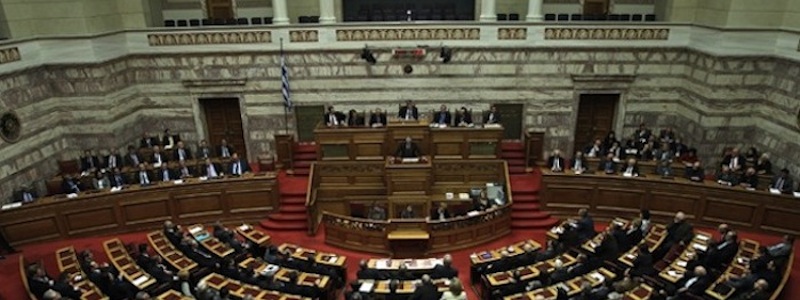I think it is clear that in the last few years most Greeks have walked away from the stereotypes of domestic politics: post-junta period, right, left, far-right, extreme-left, etc., seem fragments of a bygone rhetoric, regardless if they are spoken by contemporary people, who continue to dominate the Greek political scene. Even the ‘center’, which was in vogue during the last decade was degenerated into the so-called ‘middle ground’ and disappeared as a rhetoric and a trend when it stopped being useful in the polls.
Three years ago, the crisis exploded in the hands of George Papandreou. It was the result, however, of many years of shameful politics. Antonis Karakousis in tovima.gr has described the national failure during the last three decades in a few paragraphs. He wrote (02.03.2013): “In 1981, Andreas Papandreou assumed power promising inter alia to “change things”. Change actually did occur, some of those promised were delivered, but most of his policy announcements remained unfulfilled or proved ineffective. A part of the electorate was surely satisfied; however Papandreou failed to boost the economy or achieve significant progress for the country.
The real change was attempted after 1985, when his economic policy had collapsed and he had to endorse that of the European Union, which provided funding and rescued the economy. Then the Stabilisation and Growth Programme developed by Costas Simitis – then Economy minister – attempted the first big steps to exercise control over public finances. That 3-year project was based on the slogan “We spend more than we produce.”
Karakousis noted: “During the first year the programme was implemented by Costas Simitis, harsh measures were decided that caused a lot of reaction. In the second year, some elements of growth started to appear. The third year of the programme was about streamlining public finances. At the end of 1987 the field was dominated by debates on the budget, taxes and tax evasion. Finally, Papandreou expelled Simitis and the crowd was satisfied because the “heartless” Minister of Finance was gone. Later on, in 1988 the scandals dominated public agenda and public finances derailed. In the elections of 1989, Papandreou maximized clientelism practices and soon after deficit’s revenge came. In early 1990, the Greek state had run out of money and started borrowing with a 27% rate in order to pay salaries and pensions.
The next effort to consolidate fiscal finances by Costas Mitsotakis was not concluded due to political reasons. Then, another effort by FinMin Alekos Papadopoulos in 1994 got lost three years later in 1997 due to populist notions that prevailed in the then leading political class. Since then all efforts undertaken were incomplete and have failed, hence today’s near-bankruptcy situation…”
A similar analogy (to include also a few more PMs not previously mentioned) can be simply put as follows: deficits – clientelism – more deficits – populism – missed opportunities – timidity – political amateurism.
For foreign technocrats and scientists, Greece is a mystery. When the working hypothesis necessarily assimilates the country’s Eurozone membership, the analysts’ despair grows even further; in their minds, disaster scenarios are almost a certainty. Of course, those Nobel laureates who promised investors the bankruptcy of Greece proved to be quite wrong. Recently, one of them was forced to admit publicly that the assessment was incorrect. But was it?
Scientifically speaking it was not wrong, since, no matter how one makes the calculations, the figures “do not add up,” despite Stournaras’ confidence that within the year, or early 2014, there will be a primary surplus. What does this mean? Nothing more than that Greece will stop borrowing money to live. What follows is the need for a rapid reduction of debt, which if not achieved via a new haircut, it requires a spectacular GDP growth over the next ten years or so.
Nobel laureates and domestic politicized economists (Stournaras, Milios, Varoufakis and others) probably acknowledge that achieving such a GDP jump is a mission impossible for a country in which the ruling party of the day considers citizens (and their occupations) as election target groups and reigns depending on the electoral cycle. Moreover, this time, growth will not come from increased consumption of indigenous buyers. This is over; credit cards with predatory interest rates, and seasonal consumer loans that in the past have fueled the market and Greek banks’ easy profits are obsolete.
Growth will emerge from serious and innovative investments that can attract quality visitors (on a seasonal or permanent basis) and produce goods and services that target foreign markets. This effort requires the use of the well-known ‘comparative advantages of the country’, and involves novelty, originality, design, and communication effectiveness.
All these are not associated with ideology (to exclude the communist fairytale). The whole case is simply a matter of efficiency, in order the country to be able to exploit its comparative advantages, which -fortunately- are largely independent from the actions of Greeks. The rest is shoddy propaganda stemming from vested interests or originating from the need for group psychotherapy within party walls, depending on anyone’s prism.
The way out of the vicious circle of deficits, failure and inefficient politics require drastic solutions. It mainly requires a large proportion of Greek politicians to decide to sacrifice themselves on the altar of crisis management.
This will be the beginning of the end of the Greek problem.

